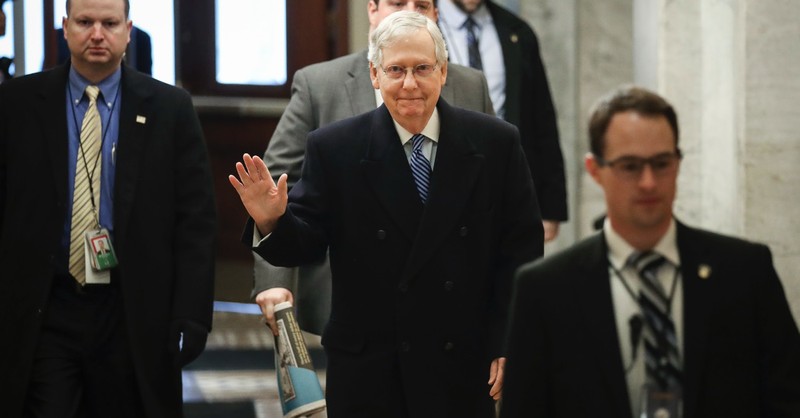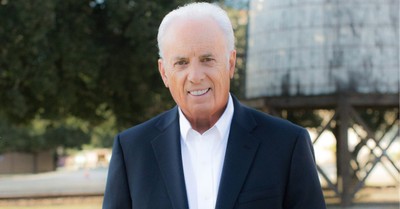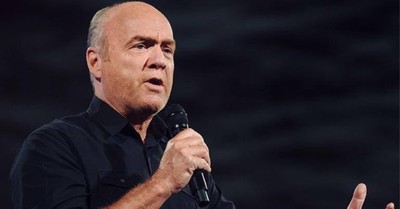Mitch McConnell Stepping Down as GOP Leader
- Michael Foust CrosswalkHeadlines Contributor
- Published Feb 29, 2024

Mitch McConnell, the U.S. senator who entered Congress during the Reagan Revolution and then helped transform the U.S. Supreme Court three decades later during the Trump years, announced Wednesday he is stepping down as leader of the Senate Republican conference effective November.
“As Ecclesiastes tells us, ‘To everything there is a season, and a time to every purpose under Heaven,’” McConnell, 82, said during a speech from the U.S. Senate floor. “... Father Time remains undefeated. I am no longer the young man sitting in the back, hoping colleagues would remember my name. It is time for the next generation of leadership.”
McConnell was elected in 1984 and was serving in his first term when liberal Sen. Ted Kennedy and the Democratic-controlled Senate defeated President Reagan’s Supreme Court nominee, Rorbert Bork, by accusing him of supporting racial segregation and opposing women’s rights. (Bork, a conservative, was replaced by Anthony Kennedy, a more moderate candidate who supported Roe v. Wade.)
McConnell’s colleagues and supporters later said the experience shaped his views of the Senate’s role in confirmation fights.
“No one has been more effective than Mitch McConnell in transforming the Supreme Court,” said Ed Whelan, a legal expert and a distinguished senior fellow for the Ethics and Public Policy Center.
McConnell rose the ranks within the Senate and became leader of the GOP conference in 2007, using the filibuster as minority leader to block or slow down the confirmation of many of President Obama’s judicial nominees.
McConnell’s most significant moment during the Obama presidency, though, came upon the 2016 death of conservative Supreme Court Justice Antonin Scalia. With Republicans having taken control of the Senate one year earlier, McConnell, the majority leader, announced that he would not hold a confirmation vote on Obama’s nominee -- Merrick Garland -- but instead would leave the seat open to be filled by the winner of that year’s presidential contest between Donald Trump and Hillary Clinton. When Trump won the White House, McConnell led the charge to confirm Trump’s nominee, Neil Gorsuch.
Four years later, McConnell again made headlines upon the death of liberal Supreme Court Justice Ruth Bader Ginsburg, who passed away less than two months prior to the election. McConnell quickly announced that the Senate would hold hearings and vote on her eventual replacement -- Amy Coney Barrett -- prior to the November election. Barrett was confirmed. Democratic critics accused McConnell of hypocrisy, but McConnell countered that he was following precedent for situations in which the White House and the Senate were held by the same party (unlike in 2016).
Barrett’s confirmation gave the Supreme Court a 6-3 conservative majority. When Trump entered office, conservatives were in the minority on the court.
As GOP leader, McConnell also led the effort to confirm Trump’s other nominee, Brett M. Kavanaugh.
McConnell’s focus on the Supreme Court paid off for conservatives when the Supreme Court overturned Roe v. Wade and handed down multiple decisions strengthening religious liberty protections. It is the most conservative Supreme Court in nearly a century.
“We are not an easy bunch to wrangle, but Mitch McConnell managed to lead us through historic legislative battles and played the pivotal role in establishing the 6-3 conservative majority on the Supreme Court,” said U.S. Sen. Kevin Cramer (R-N.D.). “I wish him all the best as he finishes out his term as leader.”
McConnell also prioritized Trump’s lower-court nominees. By the time Trump left office in January 2021, McConnell and the GOP-led Senate had confirmed more than 225 Trump-nominated judges. The 50-plus appeals court judges were the most by any president in a single term since President Carter (1977-1980).
He is the longest serving Senate leader in history and said he will serve out his term, which ends in January 2027.
Image credit: ©Getty Images/Drew Angerer/Staff
Michael Foust has covered the intersection of faith and news for 20 years. His stories have appeared in Baptist Press, Christianity Today, The Christian Post, the Leaf-Chronicle, the Toronto Star and the Knoxville News-Sentinel.



















